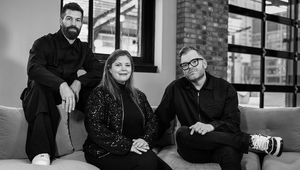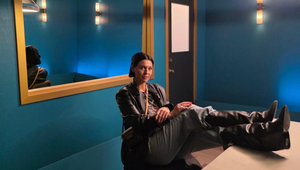
What Brands and Marketers Can Learn from Iris Apfel

Iris Apfel, the legendary fashion icon, passed away last month, leaving an enduring legacy that transcends fashion and design trends and style preferences. She was first and foremost a textile expert, and an interior designer known in certain circles. It was later in life that she became well-known as a full-fledged fashionista, a self-proclaimed 'geriatric starlet', and an influencer revered for her boldness and originality, even at 100+ years of age.
What made Iris truly magnetic and kept her relevant through a career that spanned over seven decades was her unapologetic authenticity.
She famously said: “Great personal style is an extreme curiosity about yourself.” She was a strong, independent woman unmoved by fads, trends, and monolithic cultural norms. Neither age nor expectations did anything to make her waver from who she was, which she clearly was very curious about. This was something she interrogated deeply and did the work to uncover, defined, and relentlessly own. She did not feel constrained - not by age, classic beauty standards, trends of the moment, or cultural expectations. Nothing could stop her or put limits on her relevance.

Above: Iris Apfel in 2015 via Miami Film Festival (licence: CC BY-SA 2.0)
Trends are great. Most of us follow them. Brands capitalise on them to remain relevant and appeal to new audiences. But, first must come the work to interrogate and define who you are as a brand, so that you can be authentic and remain relevant through time, versus becoming a flash in the pan. Iris was unapologetically herself and expressed it consistently. It was this reliability that drove her appeal to the masses, regardless of whether they agreed with her style choices or not. This relentless authenticity - knowing who you are and encouraging people to do the same - is a timeless principle brands should embody if they want to drive trust, remain relevant, and establish meaningful connections with their consumers.
While Iris' passing marks the end of an era, her influence on the world of fashion and beyond will continue to resonate for generations to come. She will endure as a one-woman masterclass in creating and sustaining a brilliantly disruptive brand that eschews standards and conventions, and yet manages to unite, empower and celebrate people.
So, what can we - and brands - learn from Iris Apfel about being authentic?
Show, don’t tell.
Iris famously said: “That’s not for me to do,” when asked to describe her personal style. Surely, as a direct consequence of being relentlessly authentic, one’s 'style' - if genuine -comes across in every action and detail. It is not something to be described. It is something to be experienced.
This could not be a more fitting analogy for brands. Many times, a brand tell us who they are and makes big declarations about why we should choose them over the next comparable brand. However, the most important thing for a brand to do is to show who they are consistently, through every detail, interaction, touchpoint, partnership and communication. It’s only then that today’s scrutinising and eagle-eyed consumers will not completely glaze over and roll their eyes at your message but will put you in their consideration set.
You can be authentic and still evolve. In fact, you must.
Being authentic and true to yourself can be interpreted as being doggedly set in your ways. But there is nothing more authentic and real than evolution and change. Iris' insatiable curiosity and hunger for innovation led her to adapt and change while remaining steadfast in her principles and sense of style. In fact, even when she turned 100 years of age, many of her collaborations, such as Ciaté London x Iris Apfel or Ruggable x Iris Apfel, were driven by social media - not shocking, considering her 3.1m+ followers on Instagram, but still a highly unheard-of occurrence.
Data shows that today’s consumers not only prefer brands that are culturally relevant, but also believe a brand’s cultural involvement is almost as important as a brand’s reputation when it comes to driving purchasing decisions. This underscores the importance of a brand’s ability to evolve with the times.


Apfel proved time and time again that her relevance was enduring, and a well-chosen brand partnership or collaboration is a great way to achieve that - not just by introducing your brand to new audiences, but by showing that you have a voice and a point of view that is fresh and original enough to extend to other categories.
Don’t take yourself too seriously.
Evident in her style, as well as in her witty quips that were peppered in her interviews, Iris had a great sense of humour. She did not take herself, or even her personal take on design and fashion, too seriously. Her humour made her relatable, accessible and interesting. Along with her zest for life and magnetic optimism, it endeared her to millions across generations.
Following her lead, brands should not be afraid to lighten the mood in ways that are relevant and self-aware. And there is data to support that.
In fact, 71% of US consumers prefer ads that are funny and/or entertaining (Comperemedia). Similarly, 90% of consumers say they’re more likely to remember a funny ad, and 72% would select a humorous brand over the competition, according to research from Oracle.
Yet, brands continue to be afraid of humour. This is not completely unjustifiable. Humour is hard. Humour can go wrong. But implementing it can be well worth the effort. When you know who you are as a brand, and use a consistent tone and voice, humour will come easily and authentically, becoming less risky and more relatable. Today, we are seeing more and more brands lean into humorous advertising, even in categories traditionally considered to be more serious and high-brow, such as banking and insurance.
So what can brands learn from Iris Apfel?
Be authentic in who you are and demonstrate it every day by how you act, not by what you say. Pay attention to trends, but don’t just be a follower - make them your own whenever you can, and don’t let them overshadow your POV. And last but not the least, always remember, in Iris' own words: “Humour is important in everything. Dress with a little humour and you can go a long way.”












